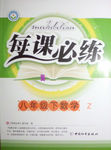题目内容
I will thank Mary for her having offered to ________the baby while I went out.
A.have an eye for B.keep an eye out for
C.keep an eye on D.cast her eye over
C

 每课必练系列答案
每课必练系列答案People often say that the Englishman’s home is his castle. They mean that the home is very important and personal to him. Most people in Britain live in houses rather than flats, and many people own their homes. This means that they can make them individual; they can paint them, and change them in any way they like. Most houses have a garden, even if it is a very small one, and the garden is usually loved. The house and the garden are the private space of the individual.
People usually like to mark their space. Are you sitting now in your home or on a train? Have you marked the space around yourself as yours ? If you are on the train you may put your coat or small bag on the seat beside you. If you share a flat you may have one corner or chair which is your own.
Once I was traveling on a train to London. I was in a section for four people and there was a table between us .The man on the space on my side of the table at all. I was angry. Maybe he thought that he owned the whole table .I had read a book about non-verbal communication, so I took various papers out of my bag and put them on his briefcase! When I did this he stiffened and his eyes nearly popped out of his head. I had invaded his space! A few minutes later I took my papers off his case in order to read them. He immediately moved his case to his side of the table. Of course, it is possible that he just wanted to be helpful to me!
If you are visiting another country you may feel that you don’t have any private space. Hotel rooms look much the same in every country in the world. All day long ,you share public spaces with other people. You see the local people in their private spaces and you feel lonely and “outside”. Local people can create their private spaces by talking about things you don’t know about .And you even feel that they like you to be outside them so that they will enjoy being inside even more! This is one of the difficulties of being a traveler !But if you understand it then it helps you .Haven’t you enjoyed being part of a group and “owning” a bit of space?
1.The writer was angry as he was traveling on a train to London because______.
|
A.he had no place to sit |
|
B.someone had invaded his “space” |
|
C.too many people shared a section with him |
|
D.some other people talked about things he didn’t know about |
2.“… you feel lonely and ‘outside’” in paragraph 4 means that_______.
|
A.you are alone outside the house |
|
B.you feel lonely because you travel on your own |
|
C.you are alone and therefore you go outside to have some fun |
|
D.you feel lonely and you don’t belong to that place or that group of people |
3.Which of the following is TRUE according to the passage?
|
A.British people dislike marking their space. |
|
B.You always feel at home in another country. |
|
C.Most British people prefer living in houses to flats. |
|
D.You can’t mark your private space in a foreign country. |
4.Tha main purpose of the passage is to tell readers to _______.
|
A.own private spaces by living in houses |
|
B.have one corner of their own in public places |
|
C.realize the importance of “space” in communication |
|
D.create their private spaces by talking with local people |
—Mum, I will leave for tha party.
—Remember your .thank your friend when you leave the party.
| A.action | B.polite | C.manner | D.manners |